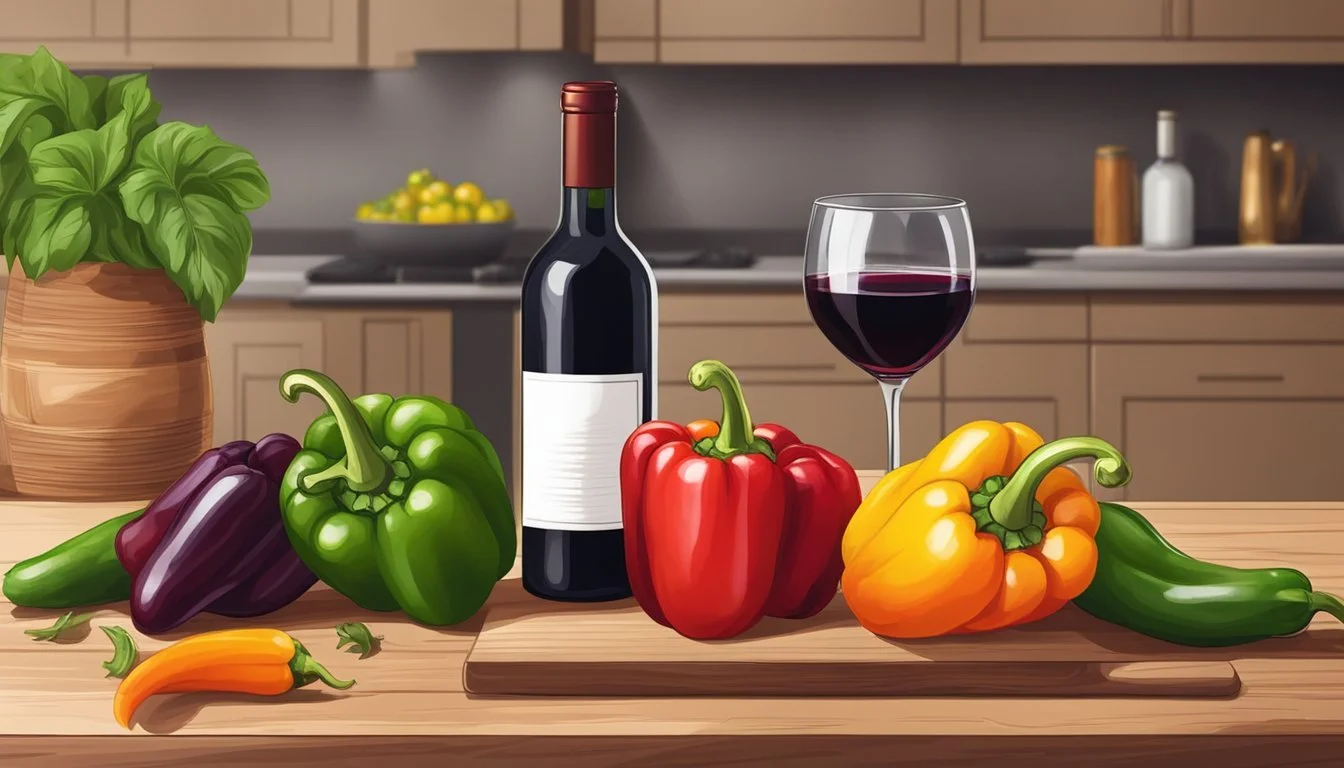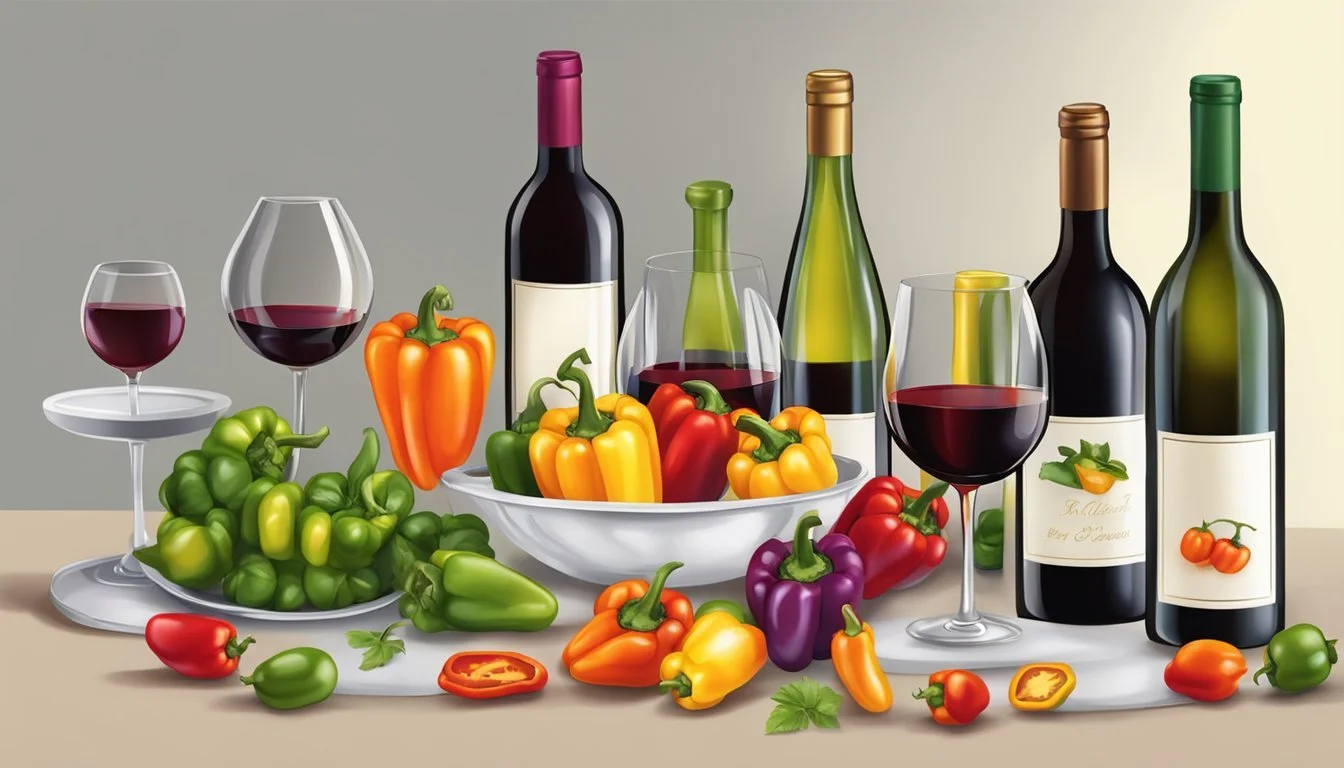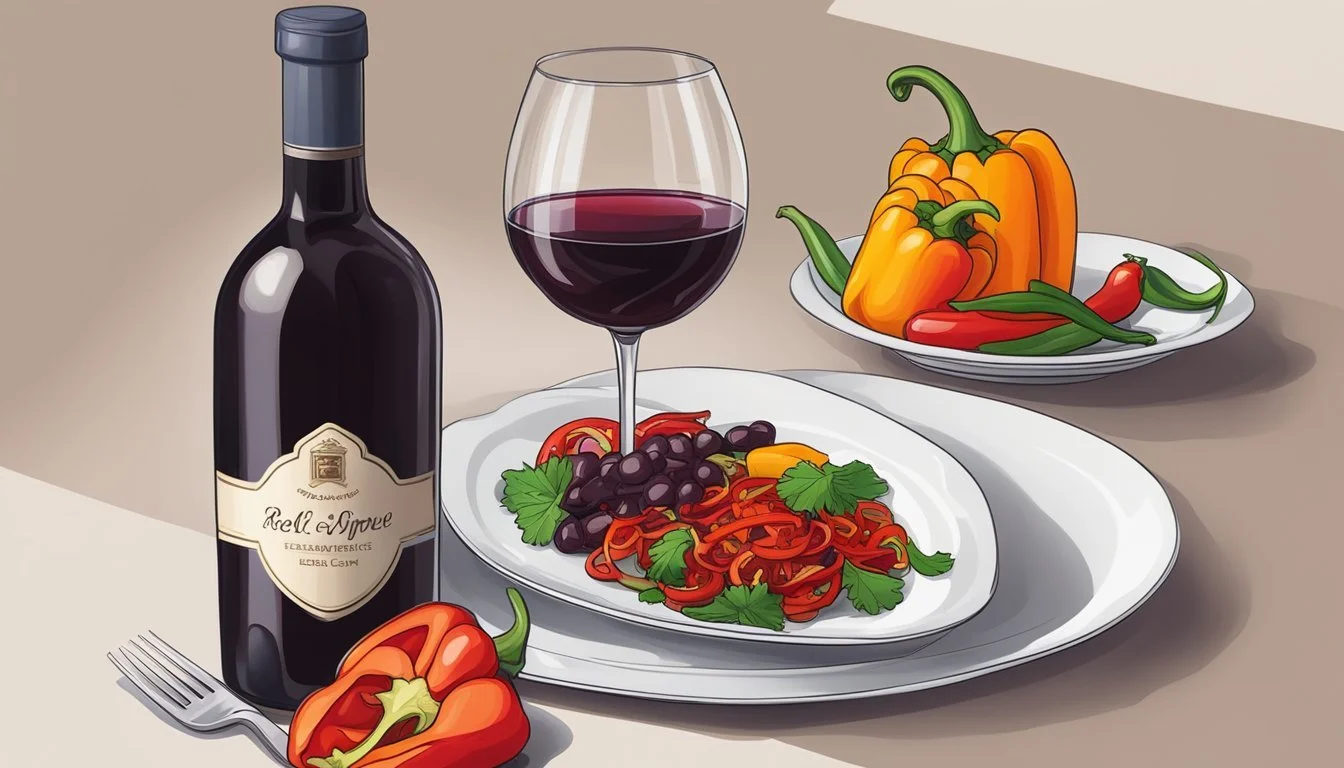What Wine Goes Well with Bell Peppers
Perfect Pairing Guide
When selecting the perfect wine to accompany bell peppers (What wine goes well with bell peppers?), the key is to consider the preparation of the dish and the resulting flavors. Bell peppers can exhibit a wide range of tastes from sweet and mild to robust and spicy, depending on how they're cooked and what they're paired with. For example, a dish that highlights the natural sweetness of roasted red peppers may require a different wine compared to a preparation that brings out the vegetal character of green bell peppers.
The versatility of bell peppers in the culinary world is mirrored by the range of wines that can accompany them. White wines typically pair well with dishes featuring bell peppers, with options such as Sauvignon Blanc offering a crisp and refreshing counterpoint to the sweetness or vegetal notes found in the peppers. For heartier dishes, where bell peppers are combined with richer ingredients like beef or creamy sauces, red wines can provide balance and enhance the overall dining experience.
In the context of wine pairing, the focus shifts to complementary flavors and the interplay between the food's characteristics and the wine's profile. Light-bodied white wines such as Pinot Blanc or Albariño may suit lighter pepper dishes, particularly those with a burst of seasoning or accompanying seafood. Conversely, for more intensely flavored bell pepper dishes, such as those featuring a black bean-tomato sauce, robust American Sauvignon Blanc or Chardonnay can provide a harmonious match that complements each nuance of the plate.
Understanding Wine Pairing Basics
Wine pairing is an art that hinges on matching the complexities of wine with the flavors of a dish. Achieving a harmonious balance ensures that neither the wine nor the food overwhelms the other, but rather, they enhance one another.
The Importance of Balance in Wine Pairing
In wine pairing, balance is paramount. A well-paired wine complements the food, matching its intensity and ensuring flavors are neither masked nor dominating. For instance, a dish with bold flavors demands a wine that can stand alongside it without being overshadowed. Conversely, a light, delicate dish benefits from a wine that doesn't overpower its subtle tastes.
To illustrate:
Heavy and rich dishes: Best with wines high in alcohol or tannins.
Light and delicate dishes: Pair well with low-tannin or high acid wines.
Assessing Taste Profiles of Wine and Food
One must consider the primary taste profiles when pairing wine and food: sweetness, acidity, tannins, and alcohol. Each component interacts differently with food flavors.
Sweetness: A wine with a hint of sweetness may complement a dish with a spicy kick, such as bell peppers in certain sauces.
Acidity: High acid wines, like Sauvignon Blanc, can cut through the richness of a dish and cleanse the palate, creating a refreshing contrast.
Tannins: Present in red wines, tannins can balance the fat content in hearty dishes.
Alcohol: Wines with higher alcohol content tend to pair better with rich, intense dishes.
Here’s a straightforward breakdown:
Spiciness
Wine Characteristic: Sweetness
Effect on Pairing: Balances the heat
Richness
Wine Characteristic: High Acid or Tannins
Effect on Pairing: Cuts through the richness
Fat
Wine Characteristic: Tannins or High Alcohol
Effect on Pairing: Balances texture and intensity
By assessing these profiles and considering the presence of components like tannins and alcohol, one can anticipate the interplay between wine and bell pepper-based dishes to create a complementary pairing.
The Role of Bell Peppers in Cooking
Bell peppers serve as a versatile ingredient in culinary arts, ranging from the sweet, ripe reds to the more earthy, green varieties, each bringing its unique flavor profile to both hot and cold dishes.
Varieties of Bell Peppers and Their Flavors
Bell peppers come in an array of colors, each with distinct tastes. Green peppers are less ripe and have a slightly bitter, vegetal flavor. As they mature, the color transitions to yellow and orange, with an increased sweetness and less of the vegetal tone. Red bell peppers are fully ripened, exuding the maximum sweetness and robust flavor among the varieties. These peppers contain the organic compound pyrazine, which contributes to their characteristic taste.
Green
Flavor Notes: Bitter, vegetal
Best Used In: Cooking
Flavor Notes: Sweet, less vegetal
Best Used In: Cooking or Raw
Red
Flavor Notes: Sweetest, robust, fruity
Best Used In: Cooking or Raw
Bell Peppers in Hot and Cold Dishes
In hot dishes, bell peppers contribute depth, especially when roasted or grilled. The cooking process caramelizes the natural sugars, enhancing their intrinsic sweetness. They complement ingredients like cooked rice in stuffed peppers or feature in sautés and fajitas. Their nutritional value also remains, lending vitamins A and C to meals.
In contrast, raw bell peppers serve as a crisp, colorful addition to salads, crudites, and sandwiches. The crunch of raw peppers juxtaposes well against softer elements in cold dishes, delivering a refreshing burst of flavor with a hint of spiciness. Their versatility allows for creativity in combining them with a broad spectrum of ingredients.
Selecting the Right Wine for Bell Pepper Dishes
Choosing the right wine to pair with bell pepper dishes enhances the flavors of the food and complements the wine's profile, whether dealing with stuffed, roasted, or fresh bell peppers.
Pairing with Stuffed Bell Peppers
Stuffed bell peppers (What wine goes well with stuffed bell peppers?) often contain a mix of ground beef, rice, and various seasonings. A medium-bodied red wine such as a Merlot or Zinfandel can pair well with the savory and hearty flavors of the meat. If the stuffed peppers are loaded with cheese, opt for a red wine with good acidity to balance the richness, such as a Chianti or Sangiovese. For lighter stuffings that might include chicken, a white wine like Chardonnay, particularly one that is not overly oaked, would provide a delightful contrast.
Ideal Wines for Roasted Bell Pepper Recipes
Roasting bell peppers deepens their sweetness and adds a smoky nuance. This method pairs nicely with a variety of wines:
White Wines: A dry Riesling or Sauvignon Blanc complements the charred sweetness of the peppers without overpowering the dish.
Red Wines: For dishes featuring roasted bell peppers alongside robust proteins such as beef or lamb, a Syrah or Cabernet Franc offers the necessary structure and spice notes.
Wines to Complement Fresh Bell Pepper Salads
Fresh bell pepper salads are crisp and vibrant, requiring wines that mirror these characteristics. A crisp white wine like Pinot Grigio or Albariño brings out the freshness of the peppers without overshadowing them. For salads that incorporate seafood or fish, a dry rosé or Verdejo can be particularly refreshing, adding a layer of complexity to the pairing.
Red Wine Options
Choosing the right red wine to pair with bell peppers involves considering the body, tannin levels, and the complexity of the wine. Red wines with moderate tannins and a balance of flavor complement the distinct taste of bell peppers.
Merlot and Velvety Textures
Merlot is a versatile wine known for its smooth and velvety texture, making it an excellent match for dishes that include bell peppers. The soft tannins and full-bodied nature of Merlot do not overpower the sweetness of the peppers, and its subtle fruit flavors harmonize well with the vegetable's natural profile.
Cabernet Sauvignon and Rich Flavors
Cabernet Sauvignon, recognized for its deep color and rich flavors, pairs splendidly with bell peppers, especially when they are part of a robust dish. The full-bodied character and higher tannin content of this wine complements the intensity of roasted or stuffed bell peppers, bringing out the complexity of both the wine and the dish.
Pinot Noir and Elegant Pairings
For an elegant pairing, Pinot Noir offers a lighter option among reds, with a medium-bodied profile that doesn't overwhelm the delicacy of bell peppers. Its vibrant color and subtle notes of red fruits can enhance the taste of bell peppers, whether they are grilled, sautéed, or featured in a pepper-centric dish.
White and Rosé Wine Selections
When pairing wines with bell peppers, one should consider white and rosé wines with characteristics that complement the sweet and sometimes herbaceous flavors of the peppers. These wines typically offer a balance of acid and fruit that can enhance the overall taste experience.
Sauvignon Blanc and Herbaceous Notes
Sauvignon Blanc is known for its bright acidity and herbaceous qualities, making it a delightful match for bell peppers. The wine's green, grassy notes pair well with the vegetable's natural sweetness, especially when the peppers are served raw or with a hint of spice. Opt for a Sauvignon Blanc with expressive fruit qualities to balance any herbal components in the dish.
Chardonnay for a Buttery Complement
Chardonnay can range from crisp and fruit-forward to full-bodied with buttery nuances, depending on the winemaking process. For roasted or grilled bell peppers, a full-bodied Chardonnay with a touch of oak can introduce a creamy texture that complements the charred, sweet flavors of the vegetables. Conversely, an unoaked Chardonnay with crisp acidity may pair well with raw or lightly cooked peppers.
Rosé for a Versatile Choice
Rosé wines, with their diverse flavor profiles, act as a versatile choice for pairing with bell peppers. They can offer the high acidity of white wines with a fruit-forward character that bridges well with various preparations of the vegetable. They are particularly suited for dishes where bell peppers are combined with other summer ingredients or Mediterranean spices. Choose a rosé with a dry profile to ensure that it stands up to the sweetness of the peppers without overpowering them.
Pairing Wine with Spicy Bell Pepper Dishes
When selecting a wine to accompany spicy bell pepper dishes, one should consider wines that can complement the heat without being overpowered. The choice largely depends on the level of spiciness and the flavors you wish to emphasize.
Zinfandel for a Hint of Sweetness
Zinfandel is an excellent option for those looking to balance the spiciness of bell pepper dishes with a touch of sweetness. Zinfandel wines are known for their bold fruit flavors and a hint of spice, which can stand up to robust dishes featuring jalapeños or other chile peppers. They tend to have higher alcohol content that helps cut through the spice while the moderate tannins provide structure without overwhelming the palate.
Flavor profile: Bold fruit, spicy undertones
Alcohol content: Typically high
Tannins: Moderate
Spice management: Cuts through spiciness
Grenache and Spicy Cuisine Compatibility
Grenache is another wine that pairs admirably with spicy cuisine. Its berry-like sweetness and subtle smokiness enhance the natural flavors of bell peppers. A dish featuring spicy bell peppers would benefit from Grenache's low tannin levels and high acidity, providing a refreshing counterpoint without clashing with the heat.
Flavor profile: Berry sweetness, smoky notes
Tannins: Low
Acidity: High
Food pairing: Complements spiciness without overpowering
Global Influences on Wine and Pepper Pairings
Choosing the right wine to complement the flavor of bell peppers depends heavily on the variety and origin of the wine. Both Old World wines from France and Italy, and New World varieties, offer distinct profiles that can enhance different pepper dishes.
Old World Wines from France and Italy
France is renowned for its Old World wines, which often pair well with food due to their balance and structure. For dishes featuring bell peppers, a red Burgundy, typically made from the Pinot Noir grape, can complement the sweetness of red peppers. When considering Merlot or Cabernet Franc, which sometimes contain vegetal notes that mirror the qualities of bell peppers, it's important to balance the intensity of the wine with the preparation of the peppers.
Italian wines, offering a diverse range of flavors, are also a good match for pepper-centric dishes. A red Chianti, made primarily from Sangiovese grapes, can stand up to heartier stuffed bell pepper recipes.
New World Varieties and Pepper Dishes
Moving towards the New World wines, such as those from the Americas or Australia, bell pepper dishes can be paired with a fruit-forward Malbec from Argentina, which provides a nice contrast to the earthiness of grilled or roasted bell peppers. A Syrah, with its spicy and bold profile, can also pair well with dishes that include blackened or spicier peppers.
For lighter preparations of bell peppers, such as those in salads, a Vinho Verde from Portugal or a Spanish Verdejo offers a refreshing and zesty quality that can cleanse the palate and enhance the natural flavors of the peppers.
Wine Pairings for Bell Pepper Dishes:
Roasted Red Peppers
Old World Wine: Burgundy (Pinot Noir)
New World Wine: Syrah
Stuffed Bell Peppers
Old World Wine: Chianti (Sangiovese)
New World Wine: Malbec
Bell Pepper Salad
Old World Wine: N/A
New World Wine: Vinho Verde, Verdejo
These pairings take into account the complementary flavors between the wines and bell peppers, ensuring a gastronomic harmony that enhances the dining experience.
Pairing Wines with Specific Bell Pepper-Infused Dishes
When selecting wines to accompany bell pepper-infused dishes, one should consider the preparation of the dish and its core ingredients. The right wine can enhance the flavor profile of the dish, whether it's meat-centric or vegetarian.
Complementing Meat-centric Recipes
Meat-filled bell pepper dishes, such as those stuffed with ground beef or lamb, benefit from wines that can balance their richness and savory notes. For recipes that involve ground beef and a robust tomato sauce, a red wine with soft tannins is suitable, as it complements the meat without overpowering it.
Chicken or seafood stuffed peppers pair well with white wines. A light Vinho Verde complements chicken's subtler flavor, while a Chardonnay from Burgundy can stand up to richer seafood offerings.
Wine Selections for Vegetarian Pepper Dishes
Vegetarian bell pepper dishes offer a variety of flavors depending on the vegetables used. For roasted or grilled bell peppers served with a medley of vegetables, a Sauvignon Blanc can bring out the freshness and slight sweetness of the peppers.
With pasta dishes incorporating bell peppers and vegetables, a Barbera or Dolcetto can be a great match due to their fruity notes and moderate acidity. Such wines work well with the natural sweetness of bell peppers and the acidity of tomato sauce in pasta dishes.
Accompaniments and Condiments
Selecting the ideal wine to complement bell peppers involves considering the various cheeses, herbs, and sauces that might accompany the dish. A thoughtful pairing enhances not only the main ingredient but also the supporting flavors.
Matching Wines with Cheeses and Herbs
When bell peppers are filled or topped with cheese, choosing the right wine can amplify the harmony of flavors. For Parmesan cheese, a bold and dry red such as Chianti can balance the saltiness. A white wine like Sauvignon Blanc, known for its crisp acidity, pairs nicely with herbs like basil or oregano typically used in stuffed pepper recipes.
Parmesan
Recommended Wine: Chianti
Herbs: Basil
Recommended Wine: Sauvignon Blanc
Ricotta
Recommended Wine: Pinot Grigio
Herbs: Oregano
Recommended Wine: Nero d'Avola
Incorporating onion and garlic into the dish introduces a savory depth that can be complemented with medium-bodied reds such as Merlot or Syrah, especially when the bell peppers have a charred or roasted profile.
Perfect Wine for Pepper-Inspired Sauces
Sauces crafted with red peppers and tomatoes tend to have a sweetness and slight acidity that is expertly matched with light red wines like Pinot Noir or fruity whites such as Riesling. For sauces that incorporate olive oil, a zesty Vermentino can cut through the richness, while maintaining the brightness of the peppers.
Red Pepper
Recommended Wine: Pinot Noir
Tomato
Recommended Wine: Riesling
For grains like rice or couscous (What wine goes well with couscous?) stuffed in bell peppers, one might opt for a Chardonnay, which has the body to stand up to these hearty fillers. Meanwhile, fish or bell peppers with a hint of jalapeños demand a wine that can tackle the inherent oiliness or spiciness of the dish. In these cases, a Gewürztraminer or an off-dry Chenin Blanc, known for their aromatic and sweeter profile, would create an appealing counterbalance to the heat and offer a refreshing contrast to the bitterness that can sometimes accompany green bell peppers.










